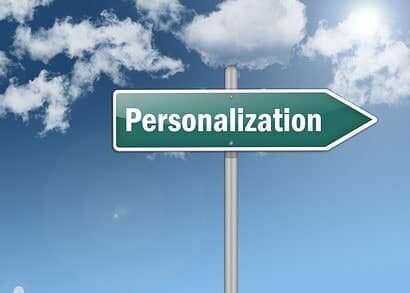 Personalisation is powerful. Call me by my name and you get more attention than if you say “hey you”. Every online marketing system allows you to personalise what you deliver to people. Whether it is a pay-per-click advert or an email marketing campaign, there are tools to make sure that you deliver what people are really interested in.
Personalisation is powerful. Call me by my name and you get more attention than if you say “hey you”. Every online marketing system allows you to personalise what you deliver to people. Whether it is a pay-per-click advert or an email marketing campaign, there are tools to make sure that you deliver what people are really interested in.
However, new research suggests this is all a myth. In an interesting series of experiments conducted at the University of Miami it appears that personalisation doesn’t make a difference to whether people buy from you. What matters is “perceived personalisation”; if people think the marketing information is personalised to them, even when it is not, they are more attracted.
Holiday makers do not care about the destination
In one experiment, an online advert contained information about a destination that the participants had previously suggested they wanted to visit. Some of them were shown an advert containing the destination name, others were shown the same advert without any destination information. There was no difference in interest between the adverts – people who were shown the non-destination advert were just as interested as those who saw the more specific adverts. What mattered was whether or not people thought the advert was personalised to them, even if it wasn’t.
Using their name matters only a little
We all get letters to “Dear First Name” – something I complained about in a blog post last year about personalisation. The second Miami experiment showed that using someone’s name did have an impact in making them feel the material was more personalised, but when people were addressed as “Dear Consumer” they had the same amount of interest in what was being offered to them as when the first name was used. But this only happened if they felt the material was personalised. Even if their name was not used but they felt the content offered was personalised they were interested.
Using the wrong name matters a lot
In the final experiment the researchers personalised the material but incorrectly. So if someone’s name were “Kevin” they were given material calling them “Dave”. In other words, the material was personalised but wrongly. This study found that people though the information was not for them. That suggests that incorrect personalisation matters more than correct personalisation.
It turns out that if we think material is personalised, even if it is not, we are attracted to it. If it is personalised, but wrongly, we reject it.
What is interesting to consider is why we might think something is personalised, when it isn’t. That must be happening at a subconscious level and I suspect it has something to do with the overall style of the language. When the writing is “personal” because it reads as though it were a conversation, one-on-one, then we perceive it as personalised, even if it isn’t.
Rather than worry about fancy tricks to personalise your marketing, you will probably do much better by producing materials that are written in a conversational style, making people think it is personalised, when it isn’t.
To discover how to use personalisation effectively in emails you need to read Chapter 4 of my latest book, .

